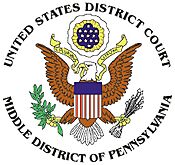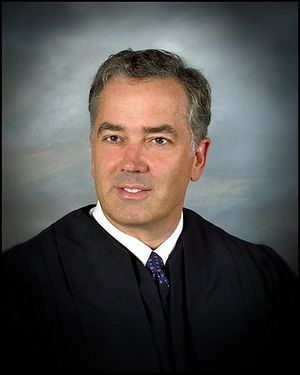Kitzmiller v. Dover Area School District facts for kids
Quick facts for kids Kitzmiller v. Dover Area School District |
|
|---|---|
 |
|
| Court | United States District Court for the Middle District of Pennsylvania |
| Full case name | Tammy Kitzmiller, et al. v. Dover Area School District, et al. |
| Argued | September 26, 2005 – November 4, 2005 |
| Decided | December 20, 2005 |
| Docket nos. | 4:04-cv-2688 |
| Citation(s) | 400 F. Supp. 2d 707 |
| Holding | |
| Teaching intelligent design in public school science classes is against the U.S. Constitution. This is because intelligent design is a religious idea, not science, and is a form of creationism. | |
| Court membership | |
| Judge(s) sitting | John E. Jones III |
| Laws applied | |
| U.S. Const. Amend. 1; Penn. Const. Art. I, § 3 | |
Kitzmiller v. Dover Area School District was a famous court case in 2005. It was the first time a U.S. federal court had to decide if intelligent design (ID) could be taught in a public school science class. The case happened in Dover, Pennsylvania.
A group of eleven parents sued their local school district to stop a new rule. The rule required teachers to present intelligent design as an alternative to the scientific theory of evolution.
The judge decided that intelligent design is a religious idea, not science. Therefore, teaching it in public school science classes goes against the U.S. Constitution. Because a textbook called Of Pandas and People was a key piece of evidence, the case is sometimes called the Dover Panda Trial.
Contents
How the Case Began
A New School Policy
The story started in 2004 in Dover, Pennsylvania. The local school board decided to make a change to the ninth-grade biology class. They felt that when students learned about Charles Darwin's theory of evolution, they should also hear about other ideas.
The board voted to require teachers to read a statement to their students. This statement suggested that evolution had "gaps" and introduced intelligent design as another "explanation of the origin of life." It also told students that a book called Of Pandas and People, which supports intelligent design, was available in the school library.
The Four-Paragraph Statement
The science teachers at the school refused to read the statement. They felt it was not based on science. Instead, a school administrator had to read it to the students. Here is a summary of what it said:
- Paragraph 1: Students have to learn about evolution for state tests.
- Paragraph 2: Darwin's theory is a "theory," not a "fact," and has "gaps."
- Paragraph 3: Intelligent design is a different explanation for how life started. The book Of Pandas and People is available for students who want to learn more.
- Paragraph 4: Students should keep an open mind. The school leaves discussions about the origin of life to students and their families.
The parents who disagreed with this policy, led by Tammy Kitzmiller, decided to take the school district to court. They were helped by organizations like the American Civil Liberties Union (ACLU).
The Trial in Court
The trial lasted for six weeks, from September to November 2005. Since it was a bench trial, there was no jury. A single judge, Judge John E. Jones III, heard all the evidence and made the final decision.
Witnesses for the Parents
The parents' lawyers brought in scientists and other experts to testify.
- Kenneth R. Miller, a biology professor, explained that evolution is a core part of modern science, supported by tons of evidence. He said that intelligent design is not science because its claims cannot be tested.
- Barbara Forrest, a professor of philosophy, showed the court documents from the intelligent design movement. She explained that the movement's goal was to promote religious ideas, not science. She also showed that early drafts of the textbook Of Pandas and People used the word "creationism." Later, "creationism" was replaced with the phrase "intelligent design."
Witnesses for the School Board
The school board's main expert witness was Michael Behe, a biochemist.
- Behe is a leading supporter of intelligent design. He argued that some things in nature, like the bacterial flagellum (a tiny motor that helps bacteria swim), are too complex to have evolved naturally. He called this "irreducible complexity."
- During questioning, however, Behe agreed that there were no scientific articles that used experiments to support the claims of intelligent design. He also said that by his personal definition of "science," even astrology could be considered scientific.
A Surprise About the Books
A key moment in the trial was about the 60 copies of Of Pandas and People that were donated to the school library. School board members Alan Bonsell and William Buckingham had said they didn't know who donated the money for the books.
But during the trial, it was revealed that Buckingham had collected money at his church and gave it to Bonsell's father to buy the books anonymously. This showed that the board members had not been truthful.
The Judge's Final Decision
On December 20, 2005, Judge Jones announced his decision in a 139-page document. He ruled completely in favor of the parents. He stated that the Dover school board's policy was unconstitutional.
In his ruling, Judge Jones wrote that:
- Intelligent design is not science. He said it fails as a science because it brings in supernatural causes, its arguments have been proven wrong by scientists, and it has not been accepted by the scientific community.
- Intelligent design is a religious idea. He explained that ID is just "a mere re-labeling of creationism" and that it "cannot uncouple itself from its creationist, and thus religious, antecedents."
- The school board's real purpose was to promote religion. Judge Jones wrote that the board members lied about their true intentions. He called their actions an example of "breathtaking inanity."
His conclusion was very clear: it is against the law to teach intelligent design as an alternative to evolution in a public school science class.
What Happened Next
A New School Board
Just before the judge made his decision, there was an election for the Dover school board. All eight board members who had voted for the intelligent design policy were defeated. The new school board, which was against the policy, immediately canceled it and chose not to appeal the judge's decision.
A Costly Case
The new school board had to pay the legal fees for the parents who had sued them. The final bill was just over $1 million. This sent a strong message to other school districts that trying to put religion into science classes could be very expensive for taxpayers.
The Judge's Comments on Honesty
In his final decision, Judge Jones strongly criticized the school board members who had supported the policy. He wrote that several of them had lied under oath to hide their religious goals. He said the citizens of Dover "deserved better" than to be led by people who were not honest.
Documentaries
- A War on Science, a BBC Horizon documentary about the court battle.
- Judgment Day: Intelligent Design on Trial, a PBS NOVA documentary that includes interviews and re-enactments from the trial.
Related Court Cases
- Scopes Trial (1925)
- McLean v. Arkansas (1981)
- Lemon v. Kurtzman (1971)
- Edwards v. Aguillard (1987)
- Freiler v. Tangipahoa Parish Board of Education (1997)
- Selman v. Cobb County School District (2004–2005)


